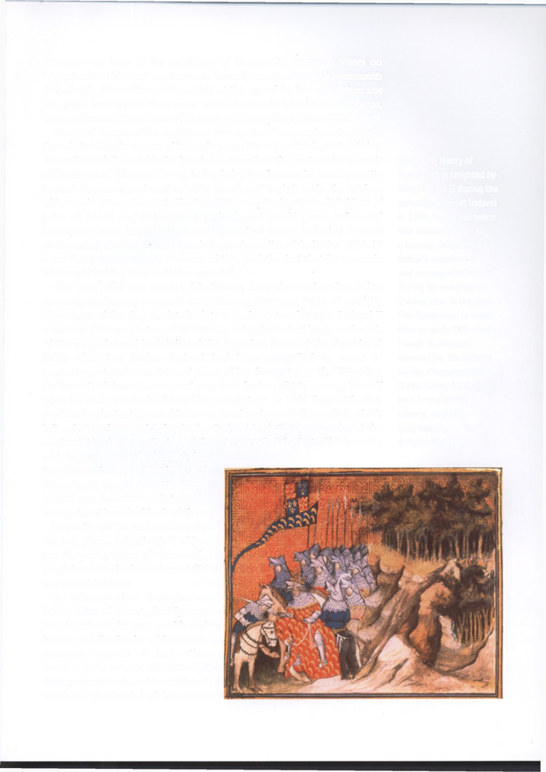Henry V: The Background, Strategies, Tactics and Battlefield Experiences of the Greatest Commanders of History Paperback (3 page)
Authors: Marcus Cowper
Tags: #Military History - Medieval


in his own country but also a vassal of the King of France in his role as Duke
of Aquitaine. Whenever either the king of England or France changed, the
King of England was required to pay homage to the King of France for his
French territories, something confirmed by the Treaty of Paris in 1259 between
Henry III and Louis IX when the English king surrendered his rights to the lost
territories in return for confirmation of the Duchy of Aquitaine. The King of
England therefore paid homage for his French territories in 1273, 1285, 1303,
1308, 1320 and 1325, though conflict also broke out over the issue in 1294
and 1324 following French confiscation of the duchy during periods of feudal
conflict. In 1337 conflict broke out once more and Philip VI of France declared
that Edward III was a disobedient vassal and confiscated the duchy. However,
this time the English response was different - Edward III claimed the throne of
France through his grandfather, Philip IV, launching the Hundred Years War.
It was this claim that Henry V would use to legitimize his programme of
conquest in Normandy, and he was the closest of all the English monarchs to
achieving the realization of that claim through the Treaty of Troyes of 1420 that
disinherited the Dauphin and made Henry the heir to the throne of France.
Prior to this the English monarchy had used the claim to the throne of
France more as a bargaining piece to extend their territorial claims, and
Edward III was willing to drop using the title following the Treaty of Bretigny,
which came out of the English victories at Crecy (1346) and Poitiers (1356)
- the latter of which had seen the capture of the French king John II.
The Dunstable Swan Jewel
This treaty gave Edward III Aquitaine, Poitou, Ponthieu and the newly
was found during
captured territory around Calais in full sovereignty in return for an
excavations at the
abandonment of the English claims to the French throne, Normandy, Anjou
Dominican Friary in
and Maine. However, this treaty rapidly broke down and war was resumed in
Dunstable in 1965. It is
1369. Henry's claims and campaigns can be seen, at least initially, as being
made of white enamel on
part of this process. However, the scale of his successes and the divided nature
gold and dates from around
of the French leadership - particularly following the murder of John the
the year 1400. The swan
Fearless of Normandy in 1419 - gave him the opportunity to push further
was adopted as a symbol
than any English king before him and make the dual monarchy of France and
by the house of Lancaster,
England a reality.
and as a livery badge is
particularly associated with
Henry V. (British Museum,
London, UK/The Bridgeman
T H E E A R L Y Y E A R S
Art Library)
The future Henry V was not born a royal prince,
but the son of a major magnate - Henry Bolingbroke,
Earl of Derby and Northampton, himself the son of
John of Gaunt, Duke of Lancaster, and son of
Edward III, thus making Bolingbroke first
cousin of the King of England, Richard II.
Henry's mother was Mary Bohun, through
whom Bolingbroke obtained the Earldom
of Hereford.
6


Henry was born in the gatehouse of Monmouth Castle in Wales on
16 September 1386, and was known in his early years as Henry of Monmouth
accordingly. His mother died in 1394 at the age of 24, but not before she
had given Bolingbroke three more sons, who would later become Thomas,
Duke of Clarence, John, Duke of Bedford, and Humphrey, Duke of Gloucester.
Henry of Monmouth's childhood was no doubt conventional enough,
though few details remain of his early years. He was certainly instructed in
the military skills suitable for his class - as well as the aristocratic pursuits The young Henry of of hunting and falconry. Owing to his father's influence, he was unusually Monmouth is knighted by learned, becoming proficient in Latin, French and English under the tutelage King Richard II during the of his uncle, Henry Beaufort. The Beauforts were the legitimized children of campaign against Ireland John of Gaunt and Katherine Swynford, and would prove influential in 1399. Henry was taken
throughout Henry's reign. There is a legend that Henry studied at Queen's into Richard's court as
College, Oxford, when Henry Beaufort was chancellor of Oxford in 1397-98 a hostage following his
- but there is no concrete evidence of this, and the fact that he was only father's banishment,
10 years old at the time militates against it.
and accompanied Richard
The year 1398 saw Henry's life thrown into chaos when his father during his campaign to
was exiled following a dispute with Thomas Mowbray, Duke of Norfolk. Ireland later in the year.
The origins of this dispute date back to a confrontation between Richard II This illustration is taken and some of his magnates in 1388. Henry Bolingbroke had been on the side from an early 15th-century of the magnates and had defeated the Ricardian forces at the short-lived French illuminated
battle of Radcot Bridge. Richard had been compelled to assent to manuscript, the
Histoire
impeachment and execution of some of his favourites in the 'Merciless
du Roy d'Angleterre Richard
Parliament' of the same year, and ever since had sought to revenge himself //(Ms.Harley 1319, fol.5), upon the lords who had infringed his prerogatives. In 1397 three of the five held in the British
great lords who had opposed him were tried and executed or exiled, which Library, London,
left only Mowbray and Bolingbroke. Richard took the opportunity of the (akg-images/
confrontation between the two of them to get rid of the last of his enemies British Library)
and, having originally decided that
the dispute between Mowbray and
Bolingbroke should be settled by a
judicial duel, he called it off at the last
moment and banished both of them
- Mowbray for life and Bolingbroke
for ten years. Bolingbroke's eldest
son, the young Henry of Monmouth,
was taken into the king's household
as a virtual hostage.
In February 1399, Bolingbroke's
father, John of Gaunt, died leaving
him to inherit the vast wealth and
territory of the Duchy of Lancaster.
However, Richard II had other
ideas and in March he extended
Bolingbroke's period of banishment
to life and confiscated all his estates
7


and his inheritance. He then undertook an expedition to Ireland, taking
Henry of Monmouth and his uncle, Henry Beaufort, with him. While Richard
was attempting to bring the rebellious Irish to heel, Bolingbroke returned to
England with a small retinue on 4 July 1399, ostensibly to claim his Duchy of
Lancaster. The Earls of Northumberland and Westmorland, along with other
northern magnates, rapidly joined him. Hearing the news in Ireland, Richard
is supposed to have said to the young Henry of Monmouth: 'Henry, my boy,
see what thy father hath done to me! He hath invaded my land and put my
subjects to death without mercy, through these unhappy doings thou wilt
perchance lose thine inheritance/
While Richard delayed his return from Ireland, Bolingbroke's party
gathered strength, and by the time Richard returned in early August he
had very little support left. Around 10 August, Richard surrendered to
Northumberland and Thomas Arundel, later Archbishop of Canterbury, at
Conway Castle and was escorted to Chester as a prisoner. From this point
onwards events moved rapidly. Richard was escorted to London where,
on 29 September, he resigned the throne, presumably under some duress.
On 30 September Parliament assembled and renounced homage and fealty to
Richard, and Henry Bolingbroke claimed the throne of England through his
line of descent from Henry III. He was acknowledged as Henry IV of England
and his eldest son, Henry of Monmouth, was acclaimed as his heir.
On 15 October Henry, who had by now been brought back from Ireland,
was granted the titles once held by the Black Prince: Prince of Wales, Duke of
Cornwall and Earl of Chester; he was also made Duke of Lancaster on
10 November 1399. His cousin, the deposed King Richard, was taken as a
prisoner to Pontefract Castle, where he would end his days in February 1400.
As heir to the throne of England the 13-year-old Henry's position and
expectations had been transformed. He was now one of the most important
figures in the country and, militarily, was required to assist his father in the
establishment of the new, Lancastrian dynasty.
T H E M I L I T A R Y L I F E